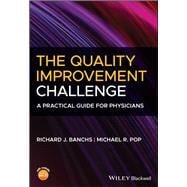Efforts to improve the quality of healthcare have failed to achieve a meaningful and sustainable improvement. Patients continue to experience fragmented, inconvenient, and unsafe care while providers are increasingly becoming overburdened with administrative tasks. The need for change is clear. Healthcare professionals need to take on new leadership roles in quality improvement (QI) projects to effect real change. The Quality Improvement Challenge in Healthcare equips readers with the skills and knowledge required to develop and implement successful operational improvement initiatives.
Designed for healthcare providers seeking to apply QI in practice, this valuable resource delivers step-by-step guidance on improvement methodology, team dynamics, and organizational change management in the context of real-world healthcare environments. The text integrates the principles and practices of Lean Six Sigma, human-centered design, and neurosciences to present a field-tested framework. Detailed yet accessible chapters cover topics including identifying and prioritizing the problem, developing improvement ideas, defining the scope of the project, organizing the QI team, implementing and sustaining the improvement, and much more. Clearly explaining each step of the improvement process, this practical guide:
- Presents the material in a logical sequence, gradually introducing each step of the process with clearly defined workflow templates
- Features a wealth of examples demonstrating QI application, and case studies emphasizing key concepts to highlight successful and unsuccessful improvement initiatives
- Includes end-of-chapter exercises and review questions for assessing and reinforcing comprehension
- Offers practical tips and advice on communicating effectively, leading a team meeting, conducting a tollgate review, and motivating people to change
Leading QI projects requires a specific set of skills not taught in medical school. The Quality Improvement Challenge in Healthcare bridges this gap for experienced and trainee healthcare providers, and serves as an important reference for residency program directors, physician educators, healthcare leaders, and health-related professional organizations.






